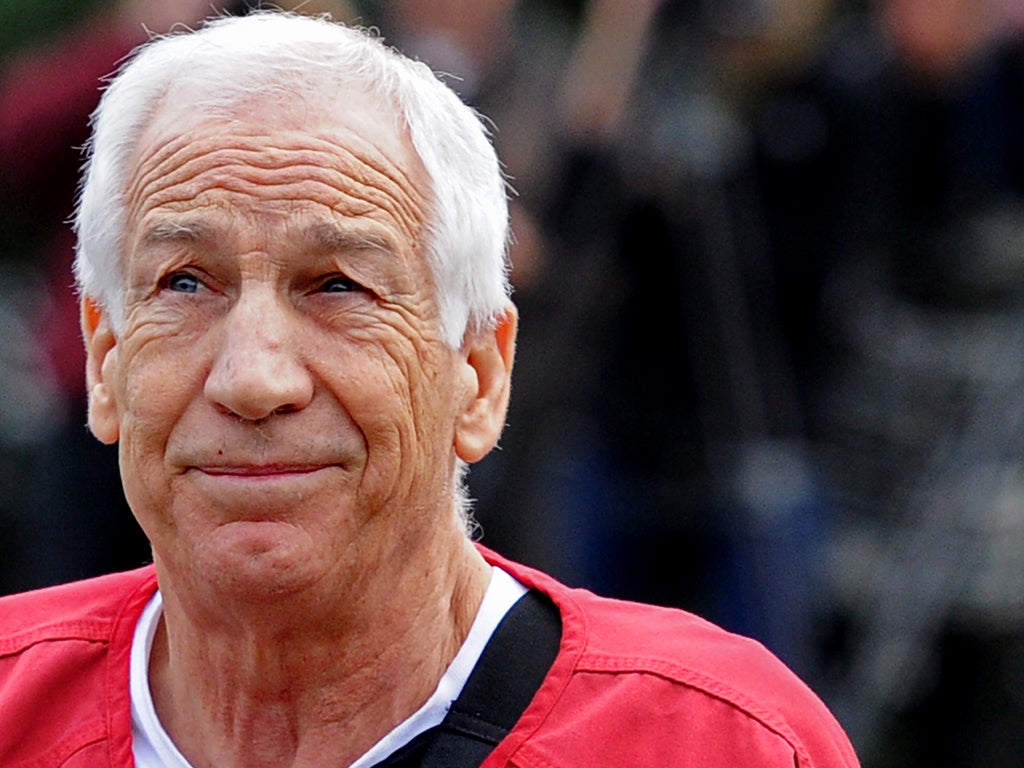Ex-Penn State coach Jerry Sandusky sentenced for 30 to 60 years in prison for sex abuse

A former assistant American football coach was sentenced today to at least 30 years in prison — effectively a life sentence — in the child sexual abuse scandal that brought shame to Penn State and led to coach Joe Paterno's downfall.
A defiant Jerry Sandusky gave a long, rambling statement in which he denied the allegations and talked about his life in prison and the pain of being away from his family.
The 68-year-old former Penn State assistant coach was found guilty in June of 45 counts of child sexual abuse, convicted of molesting 10 boys over a 15-year period. Witnesses said Sandusky used the charitable organization he founded for troubled children as his personal hunting ground to find and groom boys to become his victims.
The case, which tarnished the reputation of one of the most storied college football programs in the US and stunned a nation where college sports are revered, led to the firing of Paterno, the team's longtime head football coach, who died from lung cancer in January.
Sandusky's arrest 11 months ago, and the details that came out during his trial over the summer, transformed his public image from a college coach who had been widely admired for his work with The Second Mile charity into that of a reviled pervert who preyed on the very youngsters who sought his help.
Eight of the boys he was found guilty of molesting testified at his trial, describing a range of abuse that included fondling, oral sex and anal intercourse. One of the prosecution's star witnesses, former graduate assistant Mike McQueary, testified that he saw Sandusky raping a boy in a locker room shower.
Sandusky has consistently maintained his innocence and plans to appeal.
In a three-minute monologue aired last night by Penn State Com Radio that used some of the same language as his courtroom statement, Sandusky said he knows in his heart that he did not do what he called "these alleged disgusting acts" and described himself as the victim of Penn State, investigators, civil attorneys, the media and others.
"They can take away my life, they can make me out as a monster, they can treat me as a monster, but they can't take away my heart," he told the radio station. "In my heart, I know I did not do these alleged disgusting acts. My wife has been my only sex partner and that was after marriage."
Judge John Cleland sentenced him to 30 to 60 years in prison. Under Pennsylvania law, Sandusky cannot be released on parole before the minimum term is up.
The scandal brought devastation in State College that will take years to fully assess, as Sandusky's victims are pressing civil claims and a January trial is pending for Gary Schultz and Tim Curley, two university administrators charged with failing to properly report suspicions about Sandusky and lying to the grand jury that investigated him.
Soon after the three were arrested in November, the board of trustees fired Paterno, the school's most famous figure and a man who won two national college football championships in the 1980s. Paterno died of lung cancer in January.
Over the summer, an investigation commissioned by the university and led by former FBI Director Louis Freeh concluded that Paterno and other top officials covered up allegations against Sandusky for years to avoid bad publicity.
The scandal also toppled university President Graham Spanier and led to crippling NCAA sanctions against the football team that included a $60 million fine, a ban on postseason play and a reduction in the number of football scholarships the school can award. The NCAA also erased 14 years of victories for Paterno, stripping him of his standing as major college football's winningest coach.
At least four young men have sued Penn State over the way the university responded to disturbing complaints about Sandusky.
Eight legal teams representing at least 20 young men have surfaced, and the school recently announced an effort to settle as many claims as possible by the end of the year.
AP
Join our commenting forum
Join thought-provoking conversations, follow other Independent readers and see their replies
Comments
Bookmark popover
Removed from bookmarks